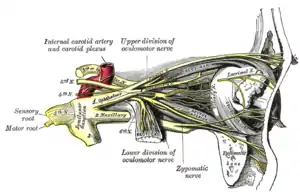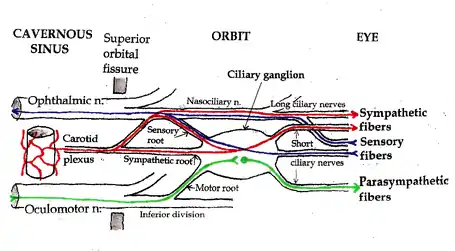Long ciliary nerves
The long ciliary nerves are 2-3[1] nerves that arise from the nasociliary nerve (itself a branch of the ophthalmic branch (CN V1) of the trigeminal nerve (CN V)). They enter the eyeball to provide sensory innervation to parts of the eye, and sympathetic visceral motor innervation to the dilator pupillae muscle.
| Long ciliary nerves | |
|---|---|
 Nerves of the orbit, and the ciliary ganglion. Side view. | |
| Details | |
| From | Nasociliary nerve |
| Fiber type | "Somatosensory" (via V1 Lacrimal), and "Sympathetic" (via V2 Zygomatic) |
| Identifiers | |
| Latin | nervi ciliares longi |
| TA98 | A14.2.01.027 |
| TA2 | 6206 |
| FMA | 52691 |
| Anatomical terms of neuroanatomy | |
Anatomy
Origin
The long ciliary nerves branch from the nasociliary nerve as it crosses the optic nerve (CN II).[1]
Course
Accompanied by the short ciliary nerves, the long ciliary nerves pierce and enter[1] the posterior part of the sclera near where it is entered by the optic nerve, then run anterior-ward between the sclera and the choroid.[1]
Function
The long ciliary nerves are distributed to the ciliary body, iris, and cornea.[1]
Sensory
The long ciliary nerves provide sensory innervation to the eyeball, including the cornea.
Sympathetic
The long ciliary nerves contain post-ganglionic sympathetic fibers from the superior cervical ganglion for the dilator pupillae muscle.[1] The sympathetic fibers to the dilator pupillae muscle mainly travel in the nasociliary nerve but there are also sympathetic fibers in the short ciliary nerves that pass through the ciliary ganglion without forming synapses.
See also
Additional images
 Pathways in the Ciliary Ganglion.
Pathways in the Ciliary Ganglion.
References
- Standring, Susan (2020). Gray's Anatomy: The Anatomical Basis of Clinical Practice (42nd ed.). New York. p. 783. ISBN 978-0-7020-7707-4. OCLC 1201341621.
{{cite book}}: CS1 maint: location missing publisher (link)
![]() This article incorporates text in the public domain from page 888 of the 20th edition of Gray's Anatomy (1918)
This article incorporates text in the public domain from page 888 of the 20th edition of Gray's Anatomy (1918)
External links